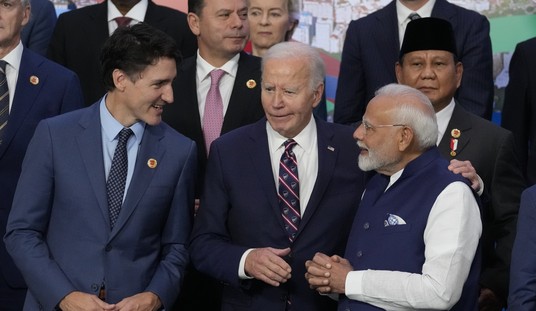Women can once again forego headscarves, wear jeans, and dress in bright colors without fearing kidnap, rape, and murder. Music stores have reopened. People can have parties in their homes again. Basra residents have reasons to celebrate after their own national army liberated them from the Mahdi militia and the imposition of shari’a law over the last three years, a liberation that appears to be permanent, according to Times of London reporter Deborah Haynes, the first Western journalist in Basra since the expulsion of Moqtada al-Sadr’s gangs:
Raids are continuing in a few remaining strongholds but the Iraqi commander in charge of the unprecedented operation is confident that his forces will soon achieve something that the British military could not – a city free from rogue gunmen.
British and US officials acknowledge tentatively that a turning point has been reached. Sir Richard Dannatt, the head of the British Army, made an unannounced visit to Basra over the weekend.
Local people are daring to hope that the dark days of death squads and kidnap are over, displaying the sort of optimism that was last seen when British forces arrived in 2003 with the false promise of a better life free from Saddam Hussein.
Driving through Basra in a convoy with the Iraqi general leading the Charge of the Knights operation, The Times passed Iraqi security forces manning checkpoints and patrolling the roads. Not a hostile shot was fired as the convoy turned into what was until the weekend the most notorious neighbourhood in the city. Hayaniya, a teeming slum, was a bastion for al-Mahdi Army, the main militia.
For the first time in four years local residents have been emboldened to stand up to the militants and are turning in caches of weapons. Army checkpoints have been erected across Basra and traffic police are also out in force.
While the Iraqi Army gets hailed as heroes, locals have focused on the British Army as the cause of their misery. Their light touch in Basra allowed Sadr and competing militias to gradually take control of Basra and the southern region, a process that accelerated when the British started to withdraw. Stephen Vincent warned of the consequences of this retreat in 2005, and the militias murdered the author of In the Red Zone for his outspokenness.
It turns out that the Mahdis used even more brutal methods than first thought. They turned southern Iraq into a Taliban- or Iranian-like state, but did nothing to improve the living standards in the city. Raw sewage runs in the streets, and the people remain as poor as they did under Saddam Hussein. Sadr’s attempt to build a personality cult failed, and without his gunmen in the streets, Basra residents now spend their time tearing down posters with his picture that his henchman installed throughout the city.
The central government in Baghdad knows it has to show these kind of improvements to keep Basra celebrating. “People can’t eat or drink peace,” one commander tells Haynes, and he’s right. If the Maliki government expects stability in the south in the post-Sadr era, it has to deliver on basic utilities and security. Employment will be a crucial issue; families need an income, and young men who remain unemployed will eventually create serious security problems.
Basra residents know that they still have serious problems to resolve, but at least they can start solving them. The dictatorship of the strutting Sadr has been lifted, and their elected government has sovereignty over their city. Music and life has returned to Basra, and they will have plenty of motivation to ensure that freedom remains.








Join the conversation as a VIP Member